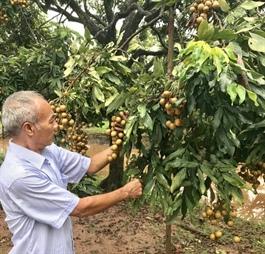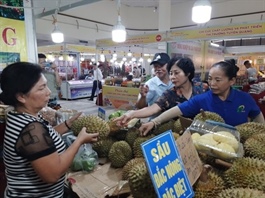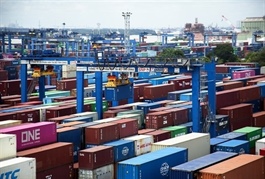Seafood businesses discuss means to achieve $10bil export target
Seafood businesses discuss means to achieve $10bil export target
Delegates at a general meeting of the Việt Nam Association of Seafood Exporters and Producers in HCM City on June 10 discussed measures to enable the seafood industry to achieve its export target of US$10 billion this year.

Nguyễn Thị Thu Sắc, chairwoman of the Việt Nam Association of Seafood Exporters and Producers, speaks at its annual general meeting in HCM City on June 10. — Photo courtesy of Vasep |
They were worth $8.9 billion last year, a decline of 18 per cent from 2022.
In the first five months of 2024, they rose by 6 per cent year-on-year to $3.6 billion, indicating a recovery, the association said.
Nguyễn Thị Thu Sắc, chairwoman of the association, said though not equivalent to the 2022 figure, it is encouraging.
“Despite the recovery in seafood exports in the second quarter, the remainder of 2024 will continue to face difficulties due to risks and uncertain factors that continue to affect an open economy like Việt Nam’s.”
This year crab exports have increased the most (+84 per cent) followed by tuna (+22 per cent) and bivalve mollusks (+13 per cent).
Shrimp and pangasius exports increased by 7 per cent and 4 per cent, while exports of squid and octopus, and other fishes declined by 1 per cent and 3 per cent.
Of the top four markets, exports to the US increased by 7 per cent, while exports to China, Japan and the EU remained unchanged from last year.
The slow recovery, competitive pressure on prices, an increase in costs, and raw material shortages would continue to impact exports in 2024, according to the association.
Sắc noted that there is “a shortage of raw materials from both aquaculture and catch.”
The aquaculture industry is affected by urbanisation, with many localities changing their land zoning plans, causing difficulties for businesses and aquaculture farmers, she said.
Climate change has impacted aquaculture, she said.
Representatives of shrimp, pangasius, and marine product businesses spoke about shrimp, squid, octopus, and surimi exports, made recommendations for building the image and marketing strategy for pangasius and removing difficulties to boost tuna exports.
They spoke about the efforts made by the association and business community to remove the European Commission's IUU yellow card.
The chairman of the association's shrimp committee, Đỗ Ngọc Tài, predicted exports to major markets such as the US, EU, Japan, and South Korea would increase from August to cater to the year-end festive season.
Until the end of the year, Ecuador, India and Indonesia will focus on the Chinese market because the US imposes high taxes on shrimp, and so Vietnamese shrimp exports to China would face fierce competition, especially in exports of black tiger shrimp, he said.
Deputy Minister of Agriculture and Rural Development Phùng Đức Tiến appreciated the association’s role, saying it is a bridge between businesses and the Government, fishing community and international markets, and contributes to the development of the Vietnamese fisheries sector.
He urged the association to intensify trade promotion to help diversify export markets and to encourage its members to apply new technologies to reduce costs.
He also exhorted it to report problems to relevant agencies to resolve them in a timely manner.
He emphasised the importance of closely monitoring market developments and providing information to businesses and farmers to help them make informed production and export plans.























